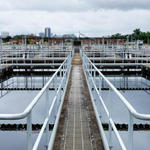| |
| |
|
The 411 for Water Treatment Professionals
|
|
|
|
|
| |
| |
| |
|
Decades of Wastewater Treatment Upgrades Make for a Healthier Bay
|

The Chesapeake Bay is one of Virginia’s most important ecological and economic assets, and the Commonwealth has been diligently working with partner states and jurisdictions on protecting the estuary. Through its partnership with the Chesapeake Bay Program, which turns 40 in December of 2023, Virginia has developed numerous initiatives to restore the Bay and its watershed. Early in the cleanup effort, Virginia found that pollution from wastewater treatment facilities showed significant opportunity for dependable and measurable nutrient reductions to the Bay.
|
|
| |
|
Elon Musk's "Boring Company" Receives Local Backlash For Wastewater Plans
|

The Boring Company, a tunnel-building company founded by Elon Musk, plans to dump 142,500 gallons of wastewater per day into the Colorado River in Texas, Insider reports. Local residents are alarmed at the plan and have pushed back. The Boring Company used an affiliate name, Gapped Bass LLC, to apply for a permit to dump the wastewater, Insider says. This is reportedly a short-term solution until the nearby Bastrop, Texas, water treatment plant is completed in 2025.
|
|
| |
|
|
| |
| |
| |
|
There's a Bipartisan Path to a Sustainable Water Future
|
“The more people know about water in general, the more likely they are to care about how water is managed and treated, and the more likely they are to be willing to protect those water resources that are local,” says Peter Gleick. One of the world’s leading water scientists, and a 2003 MacArthur Fellow, Gleick was recognized by the Carl Sagan Prize for Science Popularization in 2018 for his decades of work to bring about such understanding.
|
|
| |
|
Why Pharmaceutical Wastewater Treatment Is Vital for Public Health
|
As we find ways of helping us to stay healthy, we are inadvertently having knock-on effects on the environment, some of which could then cause more harm to us. Water pollution as a result of our use of pharmaceuticals is a huge problem worldwide. Last year, a study conducted by scientists at the University of York concluded that pharmaceutical waste in rivers poses a "threat to environmental and global health".
|
|
| |
|
|
| |
| |
| |
|
Modern Advancement in Biotechnological Applications for Wastewater Treatment through Microalgae
|
Microalgae are microscopic organisms that have a broad range of applications, from wastewater treatment, CO2 mitigation to therapeutic proteins, and pharmaceuticals. Recently, the combination of wastewater treatment-based microalgae and the use of the obtained biomass as biofertilizers/ stimulants/pesticides have been highly emphasized for their use in the agriculture field. Biofertilizers are a need of today’s agriculture practices due to the increasing demand for food to feed a hungry planet while avoiding chemical contamination by the over-application of synthetic fertilizers.
|
|
| |
|
Editorial: Innovations and Challenges in Green and Sustainable Water Purification and Waste Water Management
|
Liu et al. have reported the efficient removal of tetracycline from water solution by penicillin fermentation residue biochar activated by K2CO3. Microporous biochar (IKBCH) with an adequately high specific surface area was prepared by the impregnation process through HCl ageing, which has a superior adsorption effect on tetracycline. Tetracycline (TC) with a 200 mg/L, 99.91% removal rate was achieved when the microporous biochar dosage was taken at 1 g/L.
|
|
|
|
| |
|
|